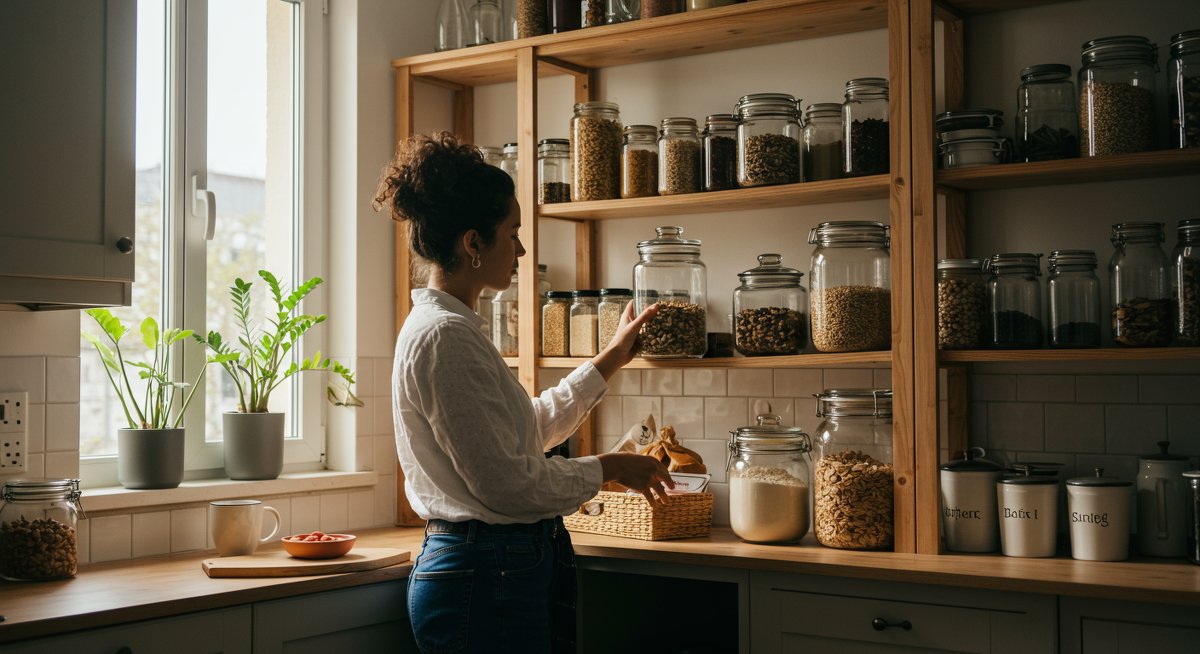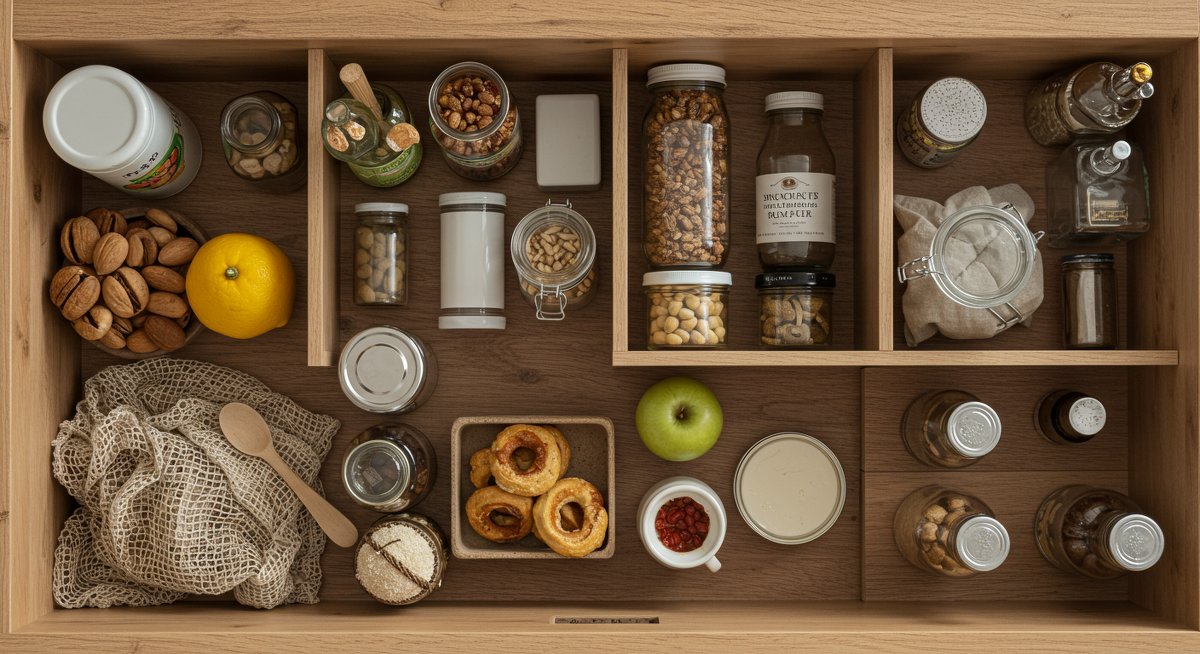Are you ready to take your commitment to sustainable living to the next level? For many of us, the kitchen is the heart of the home, and also, unfortunately, a major source of household waste. A zero-waste pantry is more than just a trend; it's a lifestyle choice. It requires thoughtful planning, conscious shopping, and a willingness to embrace reusable alternatives. This guide is designed for eco-conscious consumers like you, providing actionable strategies and insights to create a pantry that minimises waste and maximises your impact. You will discover the importance of making smart choices for your food storage, shopping habits, and overall consumption.

Deep dive into zero-waste pantry for eco-conscious living
Creating a zero-waste pantry is an ongoing journey, not a destination. It's about making small, sustainable changes over time that collectively make a big difference. Let's be honest, it might feel overwhelming at first, but it is achievable. You'll soon find that it also simplifies your life and connects you more intimately with the food you eat. You’ll be reducing your environmental impact and potentially saving money in the long run. You’ll also be taking a stand against plastic pollution and supporting a more sustainable food system.
The core principles
- Reduce Consumption: Minimise what you buy in the first place. Question every purchase: Do I truly need this? Can I borrow, rent, or find a used version? This is the foundation of zero waste.
- Refuse Single-Use: Say no to disposable items like plastic bags, plastic wrap, and individually packaged snacks. Choose reusable alternatives whenever possible.
- Reuse and Repurpose: Embrace reusable containers, jars, and bags. Get creative with repurposing items before recycling.
- Recycle Responsibly: Learn your local recycling guidelines. Recycle only what is accepted in your area.
- Rot (Compost): Compost food scraps and other organic waste to create nutrient-rich soil for your garden.
Example 1: Bulk Buying Bonanza. One of the most effective strategies is to embrace bulk buying. Bring your own reusable containers to the store and fill them with grains, nuts, seeds, and other staples. Many stores offer bulk options, allowing you to purchase exactly what you need, reducing packaging waste and often saving money. For instance, instead of buying pre-packaged rice, head to the bulk section with your reusable bags. You not only avoid the packaging but also have the flexibility to buy only the amount you require, reducing food waste.
Example 2: Smart Storage Solutions. Swap plastic containers and wraps for glass jars, stainless steel containers, and reusable beeswax wraps. This reduces plastic waste and extends the shelf life of your food. Consider using mason jars for dry goods like pasta, beans, and flour. This not only keeps them fresh, but also adds a touch of elegance to your pantry.
Example 3: DIY Pantry Staples. Reduce reliance on packaged products by making your own pantry staples. This could include making your own granola, nut butter, or even salad dressings. It cuts down on packaging and allows you to control the ingredients.
Common mistakes: A common mistake is buying too many new products at once. Start with small, achievable swaps. Another pitfall is not properly labeling containers. Always label contents and dates to avoid food waste.
Expert Tip: Plan your meals ahead of time. Knowing what you'll eat helps you shop with purpose, reducing impulse purchases and potential food waste.
Advanced strategies and insights
Maximising impact: Beyond the basics
Once you have mastered the basics, you can delve into more advanced strategies:
- Support Sustainable Brands: Research and support brands committed to ethical and sustainable practices. Look for certifications like USDA Organic, Fair Trade, and B Corp.
- Composting Champions: Master the art of composting, both indoors and outdoors, to turn food scraps into valuable compost for your garden. Consider a composting bin such as a Composting Bin if you have space.
- Meal Planning: Plan your meals in advance to reduce food waste and impulse purchases. Make a list and stick to it.
Example 1: Composting Revolution. Start a composting system to turn your food scraps into nutrient-rich soil. This reduces waste going to landfills and creates a valuable resource for your garden. Whether you opt for a traditional outdoor compost pile or a more compact indoor composting bin, it’s a powerful way to close the loop.
Example 2: Zero-Waste Meal Planning. Plan your meals in advance to reduce food waste and impulse purchases. For example, if you know you'll be making a soup, plan to use the vegetable scraps for stock. Also, make sure to use up leftovers!
Example 3: Exploring Ethical Sourcing. Educate yourself about the origins of your food. Choose brands and products that prioritise ethical and sustainable practices, such as fair trade, organic, and those with minimal packaging. Consider purchasing from local farms and farmers' markets.
Common Pitfalls: One common pitfall is not properly managing your compost bin. Learn the right ratio of 'greens' (food scraps) and 'browns' (leaves, paper) to create the best compost. Another mistake is buying too many new products without planning.
Expert Insight: Make use of your freezer! Freeze leftovers, ripe fruits, and vegetables to extend their shelf life. Also, consider growing your own herbs and vegetables to minimise waste and packaging.

Optimising your sustainable home
Extending the zero-waste philosophy
- Kitchen Audits: Regularly review your pantry and kitchen to identify areas where you can reduce waste further. This can include food storage, meal prep, and cleaning products. Consider these steps as part of your process.
- DIY Cleaning Products: Make your own non-toxic cleaning products to reduce plastic waste and exposure to harmful chemicals. This is a fantastic way to customise your cleaning products to the specific needs of your home and family. You can create all-purpose cleaners, glass cleaners, and even dish soap using simple ingredients like vinegar, baking soda, and essential oils.
- Energy Efficiency: Implement energy-efficient practices in your kitchen, such as using LED lighting, reducing phantom energy use, and choosing energy-efficient appliances. Make sure to turn off appliances when not in use, and unplug chargers when they are not connected to a device.
Example 1: The Ultimate Kitchen Audit. Conduct a thorough kitchen audit to identify areas of improvement. This involves checking your food storage, cleaning supplies, and even your appliances. Assess how much waste you generate, identify where it comes from, and determine which items can be replaced with eco-friendly alternatives. For example, you might find that you are using too much plastic wrap or buying too many pre-packaged snacks.
Example 2: Cleaning Up with DIY Solutions. Craft your own non-toxic, eco-friendly cleaning products. This involves making an all-purpose cleaner with vinegar and water. This way, you are avoiding the plastic bottles that most store-bought cleaners come in. Also, this will help you avoid harmful chemicals.
Example 3: Eco-Friendly Appliances. Invest in energy-efficient appliances. If you're replacing an appliance, look for those with high energy ratings. This small step can make a big difference in your home's environmental footprint.
Common mistakes: A common mistake is not regularly reviewing your kitchen's waste production. Another common error is overcomplicating the process. Start with a few simple changes and build from there.
Expert Tip: Educate yourself on local recycling rules to ensure you're properly recycling what you can. Also, consider using reusable shopping bags for all your shopping needs.
Scaling your impact: Beyond personal choices
Inspiring change and collaboration
- Educate Others: Share your knowledge and inspire others to adopt zero-waste practices. This can involve educating friends, family, or even your community.
- Support Sustainable Businesses: Patronise local businesses and restaurants committed to sustainability.
- Advocate for Policy Change: Get involved in local environmental initiatives and advocate for policies that support sustainability at the community level.
Example 1: Leading by Example. Inspire your friends and family by sharing your zero-waste journey. Show them the ease and benefits of sustainable choices by demonstrating how you shop, store food, and prepare meals. Organise zero-waste cooking nights or pantry makeover workshops.
Example 2: Support Eco-Friendly Businesses. Support local businesses, restaurants, and farmers' markets that prioritise sustainability. Look for places that offer bulk options, use eco-friendly packaging, and minimise waste in their operations. By supporting these businesses, you promote sustainability in your community.
Example 3: Policy Advocacy. Get involved in local environmental initiatives. Advocate for policies that support sustainability at the community level, such as improved recycling programs, composting initiatives, and waste reduction education. Contact your local representatives and attend town hall meetings to voice your support for eco-friendly policies.
Common Pitfalls: A common mistake is keeping your efforts to yourself. Sharing your knowledge and experience helps others get inspired and get started. Another mistake is not being an active part of your community.
Expert Insight: Engage with local environmental organisations. Volunteering with organisations will help to enhance your skills and commitment to sustainability.
Expert-level green living insights
Continuous improvement and adaptation
- Stay Informed: Keep up-to-date with the latest sustainable living trends, innovations, and research. Read blogs, follow social media accounts, and attend workshops to expand your knowledge and stay inspired.
- Reflect and Adjust: Regularly evaluate your zero-waste pantry and adapt your practices as needed. What works well? What could you improve? Be willing to experiment and try new things.
- Embrace Imperfection: Remember that a zero-waste pantry is a journey, not a perfect destination. Don't get discouraged by setbacks or imperfections. Embrace the process and celebrate your progress.
Example 1: Explore New Innovations. Explore new sustainable living innovations. Keep up with blogs and social media to find inspiration. Try new products or techniques that align with your lifestyle. Explore new eco-friendly brands, technologies, and practices. This can help you find fresh ways to reduce waste, conserve resources, and boost your positive impact.
Example 2: Continuous Improvement. Regularly assess and adjust your methods. Conduct a quarterly audit of your pantry and waste habits to find areas for improvement. Are there new items you could swap? Can you improve your composting process? Make small tweaks and celebrate your achievements. For example, you might find that you're still using too much plastic wrap and need to switch to beeswax wraps.
Example 3: Embrace Imperfection. Remember, every step toward zero waste counts! Don't let minor setbacks derail your journey. Acknowledge that perfection is impossible and that any reduction in waste is a win. Learn from your mistakes and focus on the positive impact of your efforts.
Common Pitfalls: One common pitfall is not updating your knowledge. Another mistake is comparing yourself to others. Everyone’s sustainability journey looks different.
Expert Insight: Collaborate with others in your community. Share tips, swap ideas, and hold each other accountable. Community support is vital for long-term sustainability.
If you are ready to take your zero-waste journey to the next level, then this is the guide for you. Creating a zero-waste pantry offers significant benefits to your personal life, your family, and the environment. By implementing these strategies, you can significantly reduce your waste, save money, and live more sustainably.